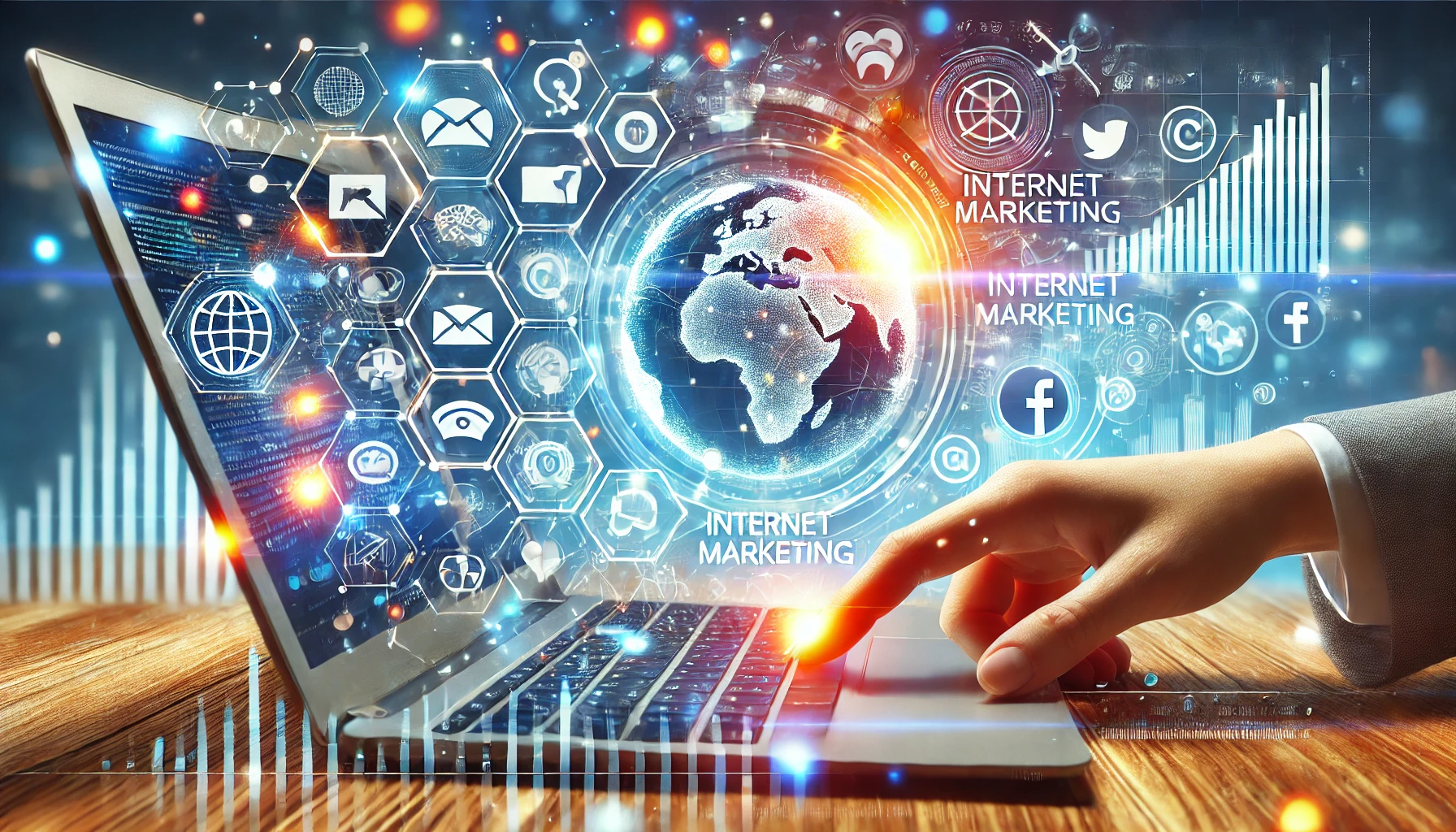Internet Marketing: The Key to Thriving in the Digital Age
In today’s fast-paced and highly connected world, businesses must harness the power of the internet to thrive. Internet marketing, often referred to as online marketing, is the use of digital channels to promote and sell products or services. It encompasses a wide range of tactics, from content creation and social media management to search engine optimization (SEO) and email campaigns. The rapid growth of digital technology has transformed how businesses engage with customers, and understanding internet marketing has become a critical aspect of any business strategy.
The Importance of Internet Marketing
The internet is now the primary source of information for most consumers, with billions of people using the web daily to research, shop, and socialize. Businesses that fail to embrace online marketing risk being left behind by competitors who are capitalizing on the digital landscape. The power of internet marketing lies in its ability to target specific audiences, build brand recognition, and drive measurable results. Through digital channels, companies can reach potential customers at every stage of the buying journey, from awareness to consideration and finally, purchase.
One of the major advantages of internet marketing is its cost-effectiveness. Compared to traditional advertising methods like TV, radio, and print, online marketing often offers a more affordable solution with the ability to scale. Small businesses, startups, and entrepreneurs can compete with larger corporations by leveraging digital tools that level the playing field.
Key Components of Internet Marketing
1. Search Engine Optimization (SEO)
SEO is a fundamental aspect of internet marketing. It involves optimizing a website’s content and structure to increase its visibility on search engines like Google. When a potential customer searches for a specific product or service, businesses want to appear at the top of the search results. SEO encompasses a variety of strategies, including keyword research, on-page optimization (like meta tags and headers), and off-page tactics (such as building backlinks). The goal is to drive organic traffic to the website and increase the likelihood of conversion.
2. Content Marketing
Content marketing is all about creating valuable, informative, and engaging content that attracts and retains a target audience. This content can take many forms, including blog posts, articles, infographics, videos, podcasts, and social media posts. The key is to provide content that solves problems or answers questions that potential customers may have. By doing so, businesses build trust and credibility, positioning themselves as experts in their field. Content marketing also plays a significant role in SEO, as high-quality content can help improve search engine rankings.
3. Social Media Marketing
Social media has become a cornerstone of internet marketing. Platforms like Facebook, Instagram, Twitter, LinkedIn, and TikTok allow businesses to connect with their audience in real time. Social media marketing involves creating engaging content that resonates with users, building a community, and driving traffic to websites or landing pages. Social media also offers businesses the opportunity to run paid ad campaigns that target specific demographics. Paid social media ads can be highly effective for driving immediate traffic and generating sales.
4. Email Marketing
Email marketing is one of the most effective ways to nurture leads and keep customers engaged. By sending targeted, personalized messages to an email list, businesses can promote new products, offer discounts, share updates, and remind customers of abandoned carts. The key to successful email marketing lies in building a high-quality email list and creating compelling subject lines, engaging content, and clear calls to action (CTAs). Many businesses use automated email campaigns to nurture leads through the sales funnel.
5. Pay-Per-Click (PPC) Advertising
PPC advertising allows businesses to drive traffic to their website through paid ads. With PPC, advertisers only pay when someone clicks on their ad, hence the name “pay-per-click.” Google Ads and Bing Ads are two of the most popular PPC platforms. Advertisers bid on keywords that are relevant to their business, and their ads appear in search engine results or on websites that are part of the ad network. PPC is a highly targeted and measurable form of advertising that can deliver immediate results.
6. Affiliate Marketing
Affiliate marketing is a performance-based marketing strategy in which businesses reward affiliates for driving traffic or sales through their marketing efforts. Affiliates can be bloggers, influencers, or other businesses that promote a company’s products or services. The affiliate receives a commission for each sale or lead generated from their promotional activities. This is a win-win for both parties, as businesses gain exposure and affiliates earn a commission for their efforts.
7. Influencer Marketing
Influencer marketing involves partnering with social media influencers or content creators to promote a brand, product, or service. Influencers have large followings and can help businesses reach a broader audience. These influencers create authentic content that showcases the product, often incorporating it into their daily lives, making it feel more natural and relatable to their followers. Influencer marketing is especially effective in industries like fashion, beauty, fitness, and lifestyle.
Measuring Success in Internet Marketing
One of the main benefits of internet marketing is the ability to measure results in real-time. With tools like Google Analytics, businesses can track website traffic, user behavior, conversion rates, and more. This data allows companies to adjust their strategies, improve performance, and ensure that marketing efforts are aligned with business goals. Metrics like Return on Investment (ROI), Cost Per Acquisition (CPA), and Customer Lifetime Value (CLV) are key indicators of success in internet marketing.
Conclusion
Internet marketing is no longer optional for businesses—it’s a necessity. As more consumers turn to the internet to research and shop, companies must ensure they have a solid online presence. By leveraging various digital marketing strategies like SEO, content marketing, social media marketing, and email campaigns, businesses can connect with their target audience, drive traffic, and increase conversions. As the digital landscape continues to evolve, internet marketing will remain a critical element of any successful business strategy.

0